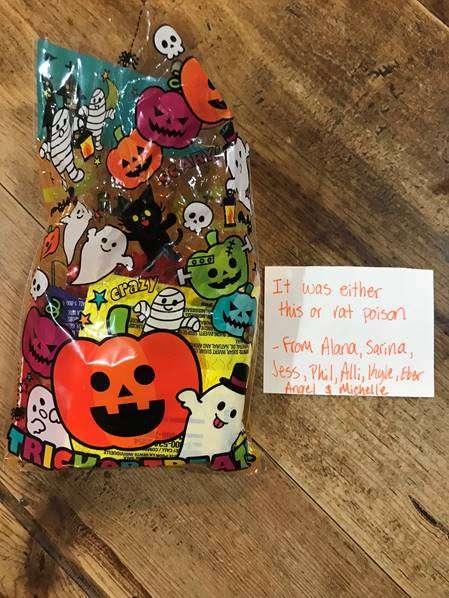The Volokh Conspiracy
Mostly law professors | Sometimes contrarian | Often libertarian | Always independent
Funny Criminal Law Halloween Present
For those of us who remember State v. Reeves, the Tennessee attempted-poisoning case discussed in the very popular Dressler Criminal Law casebook.
I had taught that case when I taught criminal law for several years, so I was much amused by this photo of a gift that Prof. David Ball at Santa Clara got from his criminal law students.

Recall the facts of Reeves, if they aren't seared into your memory: Two 12-year-old junior high school girls "decided to kill their homeroom teacher" by putting rat poison in the teacher's coffee; naturally, they told various classmates, who rightly told the authorities.
When Geiger [the teacher] entered her classroom that morning she observed Reeves and Coffman leaning over her desk; and when the girls noticed her, they giggled and ran back to their seats. At that time Geiger saw a purse lying next to her coffee cup on top of the desk. Shortly thereafter Argo [the principal] called Coffman to the principal's office. Rat poison was found in Coffman's purse and it was turned over to a Sheriff's Department investigator. Both Reeves and Coffman gave written statements to the investigator concerning their plan to poison Geiger and steal her car.
The legal question was whether this qualified as an attempt, given that the girls didn't go as far as to put the rat poison in the coffee; the court said yes, because under Tennessee law a "substantial step" coupled with the intent to commit a crime is enough to make a person guilty of the crime. (In other states, closer proximity to the actual completed crime is required.)
The authors of the note were students Alana Wilson, Sarina Jwo, Jess Miers, Phil Fox, Alli Montonye, Kyle Lee, Eber Terceros-Barrera, Angel Martinez, and Michelle Zhou. Nice.
Editor's Note: We invite comments and request that they be civil and on-topic. We do not moderate or assume any responsibility for comments, which are owned by the readers who post them. Comments do not represent the views of Reason.com or Reason Foundation. We reserve the right to delete any comment for any reason at any time. Comments may only be edited within 5 minutes of posting. Report abuses.
Please to post comments


"The legal question was whether this qualified as an attempt, given that the girls didn't go as far as to put the rat poison in the coffee"
Well, how about if a pharmacist puts the rat poison into a pill bottle for an unsuspecting patron, who think he or she is getting medicine?
Attempt law turns out to be surprisingly complicated. If you do something, with the intent of bringing about a criminal result (e.g., death or serious bodily injury to the teacher or patient), and you've completed the last step necessary on your part to reach that result -- even if, for reasons beyond your control, the result doesn't happen -- that's called a "complete attempt," and is a crime in all jurisdictions. So if the pharmacist puts the rat poison into a pill bottle and gives it to the patient, that would surely qualify as an attempt. Likewise if he leaves the bottle in a place where an assistant would normally deliver it to the patient when the patient asks for his pills.
But say the pharmacist puts the rat poison into a pill bottle, but hasn't yet given it to the patient or anyone else, so that further steps by the pharmacist are needed before the harm can take place. That would likely be the same issue as in Reeves. In Tennessee, it would be the crime of attempt (labeled by the criminal law an "incomplete attempt"). In some other states, it might not be.
"So if the pharmacist puts the rat poison into a pill bottle and gives it to the patient, that would surely qualify as an attempt."
I was referring, specifically, the Warfarin. Originally a rat poison, it is now used (by prescription only, for some reason) as a blood thinner.
So, along the way, somebody thought "Say, I wonder if this rat poison has any therapeutic uses..." and tried it out.
Oh, sorry, completely missed the joke.
I think I read one case where the court said "this wasn't an attempt, but the guy could have been bound over to keep the peace."
Whatever happened to that, by the way?